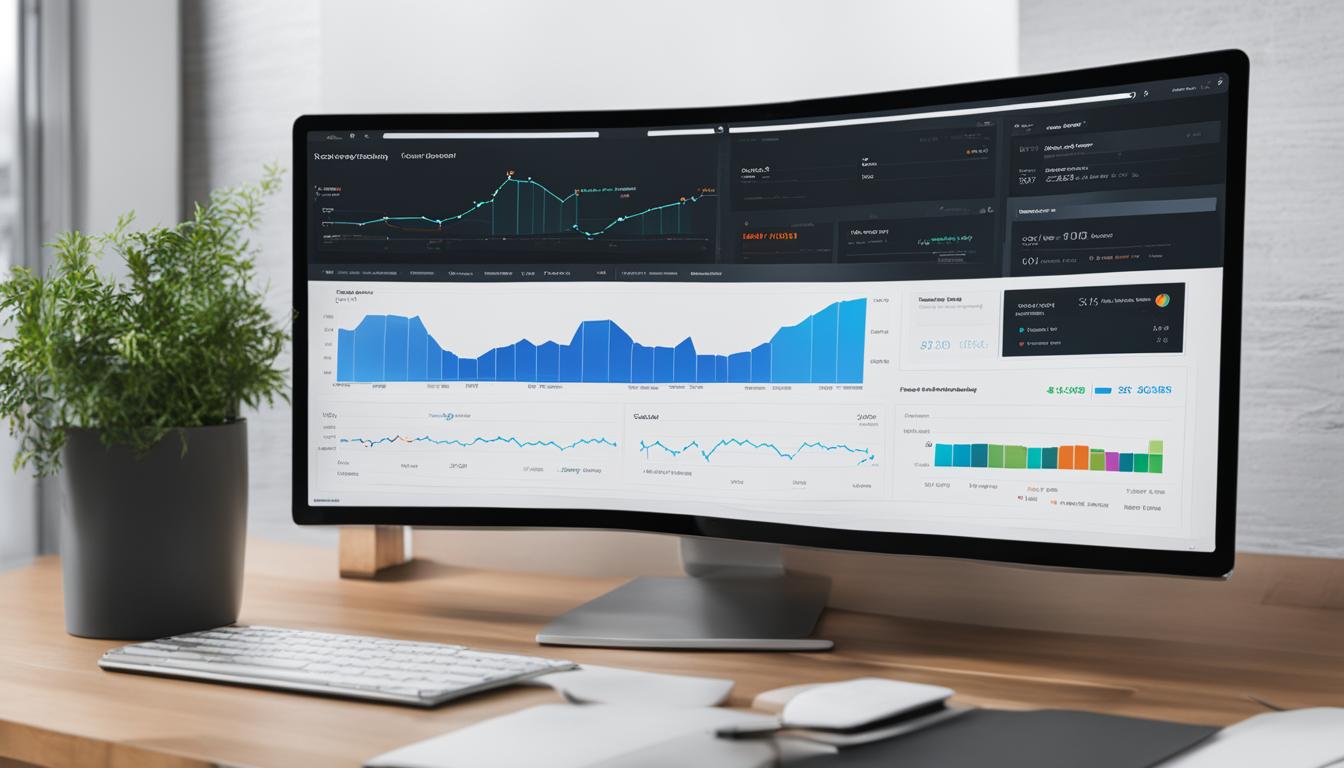In the current digital era, it’s crucial to enhance your website’s online visibility and increase organic traffic for achieving success. Nevertheless, the domain of cybersecurity threats has transformed, with perpetrators now employing a detrimental strategy known as SEO poisoning to target unaware website operators. This article aims to explore the concept of SEO poisoning, highlight the dangers it presents, and offer practical methods to protect your digital footprint.
Key Takeaways:
- SEO poisoning is a technique used by scammers to manipulate search engine results and direct users to malicious websites.
- Collaboration between cybersecurity experts and SEO professionals is crucial in protecting against SEO poisoning.
- Implementing secure coding practices, using a secure CMS and plugins, and performing regular security audits can help safeguard your website.
- Vigilant monitoring and user-generated content validation are essential in detecting and preventing SEO poisoning attempts.
- By staying updated on the latest SEO trends and taking immediate action, you can avoid falling victim to SEO poisoning attacks.
What is SEO Poisoning?
SEO poisoning is a malicious technique used by attackers to manipulate search engine results and compromise website ranking. The goal of SEO poisoning is to boost the visibility of malicious sites in search engine rankings, leading unsuspecting users to click on these sites. These malicious sites can contain various forms of threats, such as malware or social engineering attempts.
Attackers use various tactics to achieve SEO poisoning, including keyword stuffing, link injection, and exploiting vulnerabilities in search engine algorithms. By leveraging these techniques, attackers can trick search engines into ranking their malicious sites higher, thereby increasing the likelihood of user engagement and potential compromise.
It is important for website owners to be aware of SEO poisoning and its implications. By understanding the techniques used by attackers, website owners can take proactive measures to protect their online presence and ensure the integrity of their website ranking.
The Impact of SEO Poisoning
SEO poisoning can have severe consequences for both website owners and users. When users unknowingly visit malicious sites through manipulated search engine rankings, they may fall victim to various forms of attacks, such as malware infections or phishing attempts. For website owners, SEO poisoning can tarnish their reputation, result in financial losses, and damage their online visibility.
Furthermore, SEO poisoning attacks can be challenging to detect and mitigate. Attackers constantly evolve their techniques to bypass security measures, making it crucial for website owners to stay vigilant and implement effective security practices.
Preventing SEO Poisoning
To protect against SEO poisoning, website owners should prioritize website security and employ a multi-layered approach. This includes:
- Regularly updating and patching website software to address known vulnerabilities.
- Implementing robust access controls and authentication mechanisms.
- Monitoring website traffic and user behavior for any suspicious activity.
- Utilizing web application firewalls to filter out malicious requests.
- Continuously educating users and staff about potential online threats and safe browsing practices.
By adopting these preventative measures, website owners can minimize the risk of SEO poisoning and protect both their own interests and the online safety of their users.
How to Protect Against SEO Poisoning
In order to safeguard your website against SEO poisoning attacks, it is crucial to prioritize website security and implement robust measures. Collaboration between cybersecurity experts and SEO professionals is key to ensuring comprehensive protection against these threats. Here are some important steps to take:
1. Ensure Strong Website Security
Building a strong defense against SEO poisoning starts with prioritizing website security. Implementing secure coding practices is essential, including proper input validation, avoiding hardcoding sensitive information, and implementing thorough authentication and authorization controls. Regularly updating software and using web application firewalls can further enhance website security.
2. Collaborate with Cybersecurity Experts and SEO Professionals
Collaboration between cybersecurity experts and SEO professionals is crucial in protecting against SEO poisoning. These experts can work together to implement necessary security measures and stay updated on the latest threats and trends. By leveraging their combined expertise, you can optimize your website’s security and minimize the risk of SEO poisoning attacks.
3. Conduct Regular Security Audits
Regular security audits are essential to proactively identify vulnerabilities and weaknesses that could be exploited by attackers. Cybersecurity and SEO professionals can perform comprehensive vulnerability assessments, review website code, and analyze server settings to identify any potential security gaps. By conducting regular audits, you can stay one step ahead of SEO poisoning attacks.

Secure Coding Practices
When it comes to website security, secure coding practices are essential in protecting against SEO poisoning. By implementing these practices, website owners can minimize the risk of vulnerabilities that can be exploited by scammers. Here are some key secure coding practices that should be followed:
Input Validation
Input validation is crucial in preventing attacks such as SQL injection and cross-site scripting (XSS). By validating user input and ensuring that it meets the expected format and criteria, website owners can prevent malicious code from being executed on their websites. It is important to implement strict input validation measures to ensure the security of user data.
Hardcoding Secrets
Hardcoding sensitive information such as passwords and API keys directly into the source code is a common security vulnerability. Instead, website owners should utilize secure methods for storing and accessing sensitive information, such as using environment variables or secure storage solutions. This helps protect against unauthorized access to sensitive data.
Authentication and Authorization
Proper authentication and authorization controls are vital in ensuring that only authorized users have access to sensitive areas of a website. By implementing strong authentication mechanisms such as two-factor authentication and role-based access controls, website owners can prevent unauthorized access and protect against SEO poisoning attempts.
Error Handling
Effective error handling is imperative in website security. By implementing proper error handling mechanisms, website owners can prevent the disclosure of sensitive information and protect against potential vulnerabilities. Error messages should provide minimal information to attackers while still being helpful for users in understanding and resolving issues.
Use of Libraries and Frameworks
Utilizing reputable libraries and frameworks can greatly enhance website security. These tools often come with built-in security features and undergo regular updates and patching to address emerging vulnerabilities. By leveraging the expertise of these libraries and frameworks, website owners can mitigate the risk of SEO poisoning attacks.
| Coding Practices | Description |
|---|---|
| Input Validation | Implement strict input validation measures to prevent attacks like SQL injection and XSS. |
| Hardcoding Secrets | Avoid hardcoding sensitive information directly into the source code. Instead, use secure methods for storing and accessing sensitive data. |
| Authentication and Authorization | Implement strong authentication and authorization controls to ensure only authorized users have access to sensitive areas of the website. |
| Error Handling | Implement proper error handling mechanisms to prevent the disclosure of sensitive information and potential vulnerabilities. |
| Use of Libraries and Frameworks | Utilize reputable libraries and frameworks that offer built-in security features and regular updates. |

Use a Secure CMS and Plugins
When it comes to protecting your website against SEO poisoning, choosing a secure content management system (CMS) and plugins is of utmost importance. A secure CMS provides a strong foundation for your website’s security, while secure plugins add extra layers of protection. It is crucial to select CMS and plugins from reputable sources that prioritize security.
Regularly updating your CMS and plugins is equally important in ensuring their security. Developers often release new versions with security patches to address vulnerabilities that can be exploited by attackers. By staying up to date with these updates, you can minimize the risk of SEO poisoning and keep your website secure.
Having a secure CMS and plugins not only enhances your website’s defenses against SEO poisoning but also contributes to overall cybersecurity. It is an essential step in safeguarding your online presence and protecting your visitors’ information. Remember, the security of your website is in your hands, and making informed choices about your CMS and plugins is crucial.
| Benefits of Using a Secure CMS and Plugins: | Considerations for Choosing CMS and Plugins: |
|---|---|
|
|
Table: Secure CMS and Plugins
Perform Regular Security Audits
In order to effectively protect your website against SEO poisoning, it is essential to perform regular security audits. These audits help to identify any potential vulnerabilities and weaknesses that could be exploited by attackers. By conducting vulnerability assessments and thorough website code reviews, you can take proactive measures to strengthen your website’s security.
During a security audit, it is important to thoroughly analyze your server settings and configuration files. This allows you to identify any misconfigurations or weak points that could be targeted by attackers. By addressing these issues and implementing necessary security measures, you can significantly reduce the risk of SEO poisoning attacks.
Furthermore, regular security audits enable you to stay up-to-date with the latest threats and security trends. By keeping a close eye on emerging vulnerabilities and attack techniques, you can take timely actions to protect your website. Proactive security measures, such as patching vulnerabilities and staying informed about cybersecurity best practices, are crucial in maintaining the integrity of your website and safeguarding against SEO poisoning.
| Benefits of Regular Security Audits |
|---|
| Identify potential vulnerabilities |
| Strengthen website security |
| Address server settings and configuration issues |
| Stay updated on emerging threats |
| Take proactive security measures |
By regularly performing security audits, you can ensure that your website remains secure and protected against SEO poisoning attacks. These audits provide valuable insights into your website’s security posture and enable you to take necessary actions to mitigate risks and vulnerabilities.

Key Takeaways:
- Regular security audits are essential in protecting your website against SEO poisoning.
- Perform vulnerability assessments and code reviews to identify potential weaknesses.
- Analyze server settings and configuration files to address misconfigurations.
- Stay up-to-date with the latest threats and security trends.
- Take proactive security measures to maintain the integrity of your website.
Suspicious Activities to Monitor for SEO Poisoning
When it comes to protecting your website against SEO poisoning, vigilant monitoring is key. By staying alert and proactive, you can detect and prevent potential attacks before they cause significant damage. Here are some suspicious activities to watch out for:
- Unexpected Redirects: If your website suddenly redirects users to unfamiliar or suspicious sites, it could be a sign of SEO poisoning. These unexpected redirects can harm your website’s reputation and compromise user security.
- Keyword Stuffing: Keep an eye out for an abnormal amount of keywords stuffed into your website’s content. This technique is often used by scammers to manipulate search engine rankings and increase their own visibility.
- Suspicious Backlinks: Monitor your backlink profile for any abnormal or low-quality links. Scammers may try to build suspicious backlinks to your site to boost their own ranking or redirect traffic for malicious purposes.
By regularly monitoring these activities, you can quickly identify and address any potential SEO poisoning attempts. Prompt action minimizes the risk of harm to your website and helps maintain your online reputation.

Example of Suspicious Activities:
“We noticed a sudden drop in search engine rankings and an increase in unexpected redirects. Upon further investigation, we discovered that our website had been targeted by SEO poisoning. By promptly addressing these issues and conducting a comprehensive security audit, we were able to eliminate the malicious links and prevent further harm.”
In summary, staying vigilant and monitoring SEO-related activities on your website is crucial for protecting against SEO poisoning. By paying attention to unexpected redirects, keyword stuffing, and suspicious backlinks, you can proactively safeguard your website’s online presence and maintain a strong defense against scammers. Regular monitoring and quick action are the keys to mitigating the risks associated with SEO poisoning.
Validate User-Generated Content
When it comes to protecting your website against SEO poisoning, one important aspect to consider is the validation of user-generated content. User-generated content refers to any content contributed by your website’s visitors, such as comments, reviews, or forum posts. While user-generated content can add value to your website, it also presents an opportunity for scammers to inject malicious links or code.
To mitigate the risk of SEO poisoning through user-generated content, it is crucial to implement strict validation and content filtering mechanisms. These measures help ensure that only legitimate and safe content is published on your website. One effective way to validate user-generated content is by using CAPTCHAs, which can help distinguish between real users and bots.
Moderation tools are also essential for monitoring and reviewing user-generated content before it is posted on your website. With moderation tools, you can set filters and guidelines to automatically flag or reject content that may contain suspicious links or code. By proactively validating and moderating user-generated content, you can prevent SEO poisoning attempts and maintain a secure website environment.
How to Spot Search Engine Poisoning Attacks
In order to protect your website against SEO poisoning, it is crucial to be able to detect and spot these types of attacks. By being vigilant and aware of certain indicators, you can take immediate action to mitigate the effects of SEO poisoning. Here are some key signs to look out for:
Sudden Drop in Traffic
If you notice a sudden and significant drop in your website traffic, it could be a red flag indicating an SEO poisoning attack. This drop in traffic may be due to search engines recognizing the malicious activities and penalizing your website by lowering its rankings. Monitoring your website’s traffic regularly can help you identify this type of attack early on.
Spammy Backlinks
Another sign of an SEO poisoning attack is the presence of spammy backlinks pointing to your website. These backlinks are typically low-quality and come from suspicious or unrelated websites. They are often created by attackers to manipulate search engine rankings and drive traffic to their malicious sites. Regularly auditing your backlink profile can help you identify and remove these spammy links.
Blocked by Search Engines
If your website suddenly gets blocked by search engines, it could be a strong indication of SEO poisoning. Search engines have sophisticated algorithms that detect and penalize websites engaged in malicious activities. Being blocked by search engines can significantly impact your online visibility and organic rankings. Monitor search engine notifications and promptly investigate any issues related to your website’s accessibility.
Suspicious Websites
Keep an eye out for any suspicious websites that may be linked to your website without your knowledge. Attackers may create fake websites that mimic your brand or content, redirecting visitors to their malicious sites. Regularly conducting online searches related to your brand can help you identify any suspicious websites that are attempting to exploit your online presence.
By staying alert and proactive in spotting these signs, you can take immediate action to protect your website against SEO poisoning attacks. Regularly monitoring your website’s traffic, backlinks, search engine notifications, and online presence can help you detect and mitigate the effects of these malicious activities.
How to Avoid Getting SEO Poisoned
In order to prevent SEO poisoning attacks, it is important to prioritize website security and raise security awareness among staff. By implementing robust web security measures and ensuring website safety, you can significantly reduce the risk of falling victim to SEO poisoning.
One of the key steps in avoiding SEO poisoning is to stay vigilant and pay attention to abnormal SEO results. Keep a close eye on your website’s search engine rankings and traffic patterns. If you notice sudden drops or unusual fluctuations, it could be a sign of an SEO poisoning attack.
Regularly auditing your website for signs of poisoning is another crucial measure. Conduct thorough security audits to identify vulnerabilities that could be exploited by attackers. By cleaning up affected pages and staying updated on the latest SEO trends, you can mitigate the effects of SEO poisoning.
To stay ahead of SEO poisoning attacks, it is important to have a proactive approach. Stay informed about emerging threats and techniques used by scammers. By sharing information and collaborating with cybersecurity experts and SEO professionals, you can strengthen your defenses and minimize the risk of getting SEO poisoned.
Mitigation Strategies
Protecting your website from SEO poisoning requires a proactive approach. By implementing effective mitigation strategies, you can minimize the impact of these attacks and safeguard your online presence. Here are some key strategies to consider:
Regular Audits
Regularly auditing your website is crucial to detect any signs of SEO poisoning and take appropriate action. Conduct comprehensive security audits to identify vulnerabilities and weaknesses that could be exploited by attackers. This includes reviewing your website code, configuration files, and server settings to ensure robust security measures are in place.
Cleanup of Affected Pages
If your website has been compromised by SEO poisoning, it’s important to clean up the affected pages promptly. Remove any malicious content, links, or scripts injected by attackers. Conduct a thorough scan of your website to ensure all traces of the attack have been removed, and restore your website to its original state.
Stay Updated on SEO Trends
SEO trends and techniques are constantly evolving, and staying updated is essential for protecting your website. Stay informed about the latest SEO practices to understand potential vulnerabilities that scammers may exploit. By staying ahead of the curve, you can implement proactive measures to mitigate the risk of SEO poisoning attacks.
| Mitigation Strategies | Benefits |
|---|---|
| Regular Audits | – Identifies vulnerabilities – Enables timely action |
| Cleanup of Affected Pages | – Removes malicious content – Restores website integrity |
| Stay Updated on SEO Trends | – Mitigates evolving threats – Implements proactive measures |
Implementing these mitigation strategies will enhance your website’s security and reduce the risk of falling victim to SEO poisoning attacks. By regularly auditing your website, cleaning up affected pages, and staying updated on SEO trends, you can protect your online reputation and maintain a safe browsing experience for your visitors.
Image source: https://seowriting.ai/32_6.png
The Blender 3D SEO Poisoning Campaign
In our ongoing exploration of SEO poisoning techniques, we now turn our attention to the infamous Blender 3D SEO poisoning campaign. This particular campaign highlights the extent to which scammers will go to exploit popular brands and deceive unsuspecting users.
The Blender 3D SEO poisoning campaign utilizes malicious search engine advertisements and fraudulent ads to redirect users to attacker-controlled websites. By manipulating search engine results and creating deceptive ads, scammers aim to lure users into visiting websites that may contain malware or engage in fraudulent activities.

This campaign serves as a stark reminder of the importance of website owners taking proactive measures to protect their online presence. By implementing robust security practices and staying vigilant, website owners can minimize the risk of falling victim to similar SEO poisoning campaigns.
Protecting Against Blender 3D SEO Poisoning
To protect your website and brand reputation against the Blender 3D SEO poisoning campaign and other similar attacks, we recommend the following:
- Regularly monitor your search engine rankings and website traffic to detect any sudden drops or anomalies.
- Implement strict ad filtering and validation mechanisms to prevent the display of fraudulent or malicious ads on your website.
- Stay updated on the latest SEO trends and changes, and adjust your SEO strategies accordingly to maintain a strong online presence.
- Collaborate with cybersecurity experts and SEO professionals to ensure comprehensive protection against SEO poisoning attacks.
By being proactive and implementing these preventive measures, you can significantly reduce the risk of falling victim to the Blender 3D SEO poisoning campaign and other malicious activities.
| Blender 3D SEO Poisoning Campaign Summary | |
|---|---|
| Attack Technique | SEO poisoning through malicious search engine advertisements and fraudulent ads. |
| Objective | Redirecting users to attacker-controlled websites to spread malware or engage in fraudulent activities. |
| Impact | Potential compromise of user data, reputation damage to affected brands, and financial losses. |
| Preventive Measures |
|
The SEO Poisoning Payloads
SEO poisoning payloads are a common method used by scammers to compromise websites and exploit unsuspecting users. These payloads often come in the form of malicious zip files containing malware that can wreak havoc on a website and compromise user data. It is crucial for website owners to be aware of these payloads and have robust security measures in place to detect and mitigate their effects.
“Malicious zip files containing malware are a significant threat to website security and user privacy. These payloads can contain various types of malware, including information stealers that are designed to collect sensitive data from users. It is important for website owners to stay vigilant and implement strong security measures to protect against SEO poisoning attacks that utilize these payloads.”
By regularly updating antivirus software, conducting thorough security scans, and educating staff about the dangers of opening suspicious files, website owners can reduce the risk of falling victim to SEO poisoning payloads. It is also essential to have proper backup and recovery mechanisms in place to restore the website in case of a successful attack.
Protecting Against SEO Poisoning Payloads
To protect against SEO poisoning payloads, website owners should:
- Ensure that all files downloaded from the internet are scanned for malware before being opened or executed.
- Regularly update antivirus software and perform full system scans to detect and remove any existing malware.
- Implement strict file upload validation to prevent malicious files from being uploaded to the website.
- Train staff to recognize and report suspicious files or email attachments.
By following these best practices and staying informed about the latest security threats and vulnerabilities, website owners can enhance their protection against SEO poisoning payloads and keep their websites and users safe.
| SEO Poisoning Payloads | Potential Risks |
|---|---|
| Malicious Zip Files | Contain malware that can compromise website security and user privacy. |
| Information Stealers | Designed to collect sensitive data from users. |
By staying proactive and implementing comprehensive security measures, website owners can minimize the impact of SEO poisoning payloads and protect their online presence.
Widening the Attack Surface
As scammers continue to find new ways to infiltrate websites and compromise online security, they are increasingly widening the attack surface by impersonating popular software. By impersonating trusted and commonly used software, attackers gain access to a wider audience and increase their chances of success. This deceptive tactic makes it even more challenging for website owners to protect their online presence and reputation.
One of the key components in fighting against this widening attack surface is fraud detection. By implementing robust fraud detection measures, website owners can identify and mitigate potential threats before they cause significant damage. Utilizing advanced algorithms and machine learning techniques, fraud detection systems can analyze patterns and behaviors to spot suspicious activities and prevent attackers from gaining access to sensitive information.
The Importance of Legal Actions
Legal actions play a crucial role in combating scammers who impersonate popular software. Website owners should be proactive in monitoring their brand reputation and take immediate legal action against fraudulent domains that mimic their brand names. This not only protects their reputation but also sends a strong message to scammers that their malicious activities will not go unpunished.
“Fraud detection and legal actions are essential in protecting against scammers who impersonate popular software.”
By combining fraud detection tools with legal actions, website owners can effectively mitigate the impact of SEO poisoning attacks. It is imperative to stay vigilant, regularly monitor for suspicious activities, and take the necessary steps to safeguard online presence and brand reputation.
Conclusion
In conclusion, protecting against SEO poisoning requires collaboration between cybersecurity experts and SEO professionals. By working together, we can implement robust security measures and stay one step ahead of scammers.
One of the key strategies for protecting against SEO poisoning is vigilant monitoring. We must stay alert for any suspicious activities on our websites, such as sudden drops in rankings or the presence of spammy backlinks. By promptly investigating and addressing these anomalies, we can minimize the damage caused by SEO poisoning.
Furthermore, implementing robust security measures is essential. This includes regularly conducting security audits to identify and address potential vulnerabilities. It’s crucial to stay updated on the latest SEO trends and changes, as scammers are constantly evolving their tactics. By staying proactive and informed, we can better protect our online presence.
In summary, protecting against SEO poisoning requires a collaborative effort and a commitment to vigilant monitoring and robust security measures. By prioritizing website security and staying proactive, we can safeguard our online presence and mitigate the risks posed by scammers.
FAQ
What is SEO poisoning?
SEO poisoning is a technique used by attackers to manipulate search engine results and push malicious sites higher up in the rankings. The goal is to increase traffic to these malicious sites, which may host malware or attempt social engineering.
How can I protect my website against SEO poisoning?
To protect your website against SEO poisoning, you should prioritize website security, collaborate with cybersecurity experts and SEO professionals, implement secure coding practices, use a secure content management system (CMS) and reputable plugins, conduct regular security audits, monitor for suspicious activities, validate user-generated content, and spot signs of SEO poisoning attacks.
What are secure coding practices?
Secure coding practices include input validation, avoiding hardcoding sensitive information, implementing proper authentication and authorization controls, proper error handling, and using reputable libraries and frameworks. These practices help make your website more resilient against SEO poisoning attempts.
How can I choose a secure CMS and plugins?
When choosing a CMS and plugins, opt for reputable sources. Regularly update the CMS and plugins with the latest security patches to address vulnerabilities that can be exploited by attackers. By using secure CMS and plugins, you can reduce the risk of SEO poisoning.
Why should I perform regular security audits?
Regular security audits help identify potential vulnerabilities and weaknesses that could lead to SEO poisoning attacks. These audits involve reviewing website code, configuration files, and server settings to proactively address security gaps. By conducting regular security audits, you can protect the integrity of your SEO efforts and prevent SEO poisoning.
How can I monitor for suspicious activities?
Be vigilant for suspicious activities such as sudden drops in search engine rankings, keyword stuffing, unexpected redirects, or suspicious backlinks. By promptly investigating and addressing these anomalies, you can minimize the damage caused by SEO poisoning.
How can I validate user-generated content?
Implement strict validation and filtering mechanisms for user-generated content. This includes using CAPTCHAs, moderation tools, and content filtering to maintain a secure website environment. By validating user-generated content, you can prevent SEO poisoning attempts.
What are the signs of an SEO poisoning attack?
Signs of an SEO poisoning attack include a sudden drop in website traffic or rankings, an increase in spammy or low-quality backlinks, and being blocked by search engines. Stay vigilant in spotting these signs and take immediate action to mitigate the effects of SEO poisoning.
How can I avoid getting SEO poisoned?
To avoid getting SEO poisoned, prioritize security awareness among your staff, maintain web security and malware protection measures, ensure website safety by addressing vulnerabilities, and disclose abnormal SEO results to search engines. These preventive measures can minimize the risk of SEO poisoning.
What are some mitigation strategies for SEO poisoning?
In case of an SEO poisoning attack, implement mitigation strategies such as regularly auditing the website for signs of poisoning, cleaning up the affected pages, and staying updated on the latest SEO trends and changes. By implementing these strategies, you can mitigate the effects of SEO poisoning and protect your online reputation.
What is the Blender 3D SEO poisoning campaign?
The Blender 3D SEO poisoning campaign is an example of how scammers use SEO poisoning to target popular brands. By altering search engine results and creating fraudulent ads, scammers redirect users to attacker-controlled websites. Be aware of such campaigns and take measures to protect your brand reputation.
What are SEO poisoning payloads?
SEO poisoning payloads can contain malicious files, such as zip files that contain malware. These malware can be information stealers designed to steal sensitive data from users. Be cautious of downloading suspicious files and have robust security measures in place to detect and mitigate such payloads.
How can scammers widen their attack surface with SEO poisoning?
Attackers behind SEO poisoning campaigns often impersonate popular software to widen their attack surface. Be vigilant in detecting fraudulent domains that resemble your brand names and take legal actions to protect your reputation. By monitoring and taking necessary actions, you can mitigate the impact of SEO poisoning attacks.
How should I protect against SEO poisoning?
Protecting against SEO poisoning requires collaboration between cybersecurity experts and SEO professionals. Implement robust security measures, conduct regular audits, and stay vigilant in monitoring website activities. Prioritize website security and stay updated on the latest SEO trends to safeguard your online presence.










